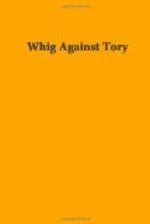“It was not in such a man as Enoch Crosby, to seek ease, or shun danger, in the hour of his country’s trial. He saw others making sacrifices—women as well as men—youth as well age—and he scorned to have it said, that he could not make sacrifices, as well as others. His musket was therefore taken down; and fitting on his knapsack, he took up his march towards the head quarters of the American army on the Hudson.
“In a few days, he reached the neutral ground and”——
William. “Pray, father, may I interrupt you, to inquire what was meant by the ’neutral ground?”
Gen. P. “I will explain it to you. At this time (Sept. 1776,) the head quarters of the British army were in the city of New York. The American army lay up the Hudson, fifty or sixty miles, either at, or near, West Point.
“Between the two armies, therefore, was the county of West Chester, the centre of which being occupied by neither, was called the ’neutral ground.’ But, in reality, it was far from being a neutral spot.”
William. “Why not, father, if neither the British, nor the Americans, occupied it?”
Gen. P. “Because, my son, it was here that a great number of tories resided—the worst enemies which the Americans had to contend with.”
Henry. “Worse than the British, father?”
Gen. P. “In several respects worse. The tories, in general, were quite as unfriendly to American liberty, as the British themselves. And, besides, living in the country, and being acquainted with it, they could do even more injury than strangers.
“Many of this description of persons lived on the ‘neutral ground;’ and, what was worse, they often pretended to be Whigs—and passed for such—but in secret, did all in their power to injure their country.
“Crosby, as I told you, had reached a part of this ground, on his way to the American camp. It was just at evening, that he fell in with a stranger, who appeared to be passing in the same direction with himself.
“‘Good evening,’ said the stranger—’which way are you travelling?— below?’”
William. “Which way was that?”
Gen. P. “Towards New-York. The British were sometimes called the ’lower party’—the Americans the ‘upper party’ because the latter lay north of the former. The stranger meant to ascertain which party Crosby was going to join.”
Henry. “And did Crosby tell him?”
Gen. P. “No: he replied, that he was too much fatigued to go much farther that evening, either above or below; but he believed he should join himself to a bed, could he find one.
“‘Well,’ said the stranger, ’listen to me; it will soon be dark—go with me—I live but a short distance from this—you shall be welcome.’
“Crosby thanked him, and said he would gladly accept his kind invitation.




